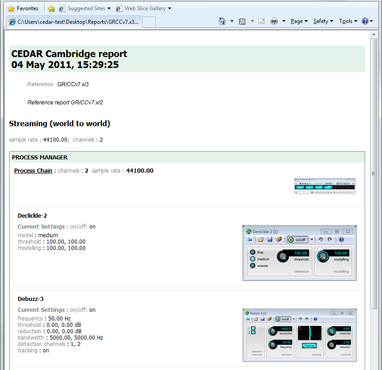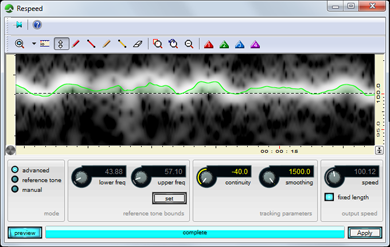The most significant upgrade yet

PRODUCT ANNOUNCEMENT: 12 May 2011
Based on the latest CEDAR Cambridge Series III hardware, Version 7 is a massive step forward in audio restoration and speech enhancement. It boasts a hugely improved file processing system, a powerful new module, Respeed, a unique new declick algorithm, Manual Declick 'B', the introduction of Reporting, and dozens of improvements to existing modules including Retouch, DNS, NR-4 and NR-5, the Adaptive Limiter and Vintage Decrackle.
Cues, regions, hot keys, MP3s, video files and more...
Many aspects of the CEDAR Cambridge file processor are almost unrecognisable when compared with previous versions. Among the most obvious of these is the introduction of cue points and regions. These allow users to attach text to the audio and to set up multiple regions for rendering, both of which are of huge benefit to users in the film/TV and audio forensic fields. Cue data can be saved in the metadata chunks of WAV files, allowing them to be transferred between CEDAR Cambridge systems and other workstations that recognise those chunks.
Other improvements include a spectrogram view to augment the existing waveform view, improved transport controls, improved channel mapping, the ability to perform transparent sample rate conversion while saving files, and the introduction of user-definable Hot Keys, which allow operators to control the system from their keyboard and from devices such as foot-pedals that map to the key commands. This is ideal for users (particularly in the field of audio forensics) who need to listen repeatedly to short snippets of audio.
 CEDAR Cambridge V7 also recognises many new audio formats including MP3 and other Windows Media formats. What's more, it can now handle many video files, allowing users to drag them into its file processor, whereupon the audio will be extracted ready for immediate use.
CEDAR Cambridge V7 also recognises many new audio formats including MP3 and other Windows Media formats. What's more, it can now handle many video files, allowing users to drag them into its file processor, whereupon the audio will be extracted ready for immediate use.
The Report Generator
CEDAR has introduced the report generator to help audio engineers, archivists and forensic investigators keep track of the processing applied to their audio. This creates two reports: a snapshot of the current process chain or the history of the actions carried out upon a file since it was most recently loaded into the File Processor.
Two output formats are also provided: an HTML report that can be displayed in standard browsers, and an XML file that can be used to generate bespoke reports. All user-interface images are recorded in .PNG format graphic files with an attached list of processing parameters so that, as well as providing a convenient presentation format, setups can be recreated by hand as well as by using the system's native .CCW configuration files.
 Respeed
Respeed
Speed errors encountered in recordings and upon playback can be caused by many problems. Examples include faulty tape recorder transports, sticky tapes, batteries going flat in analogue recording devices, and the off-centre holes in disks that lead to wow. In each case, the recording or the replayed audio exhibits speed changes with respect to what would have been recorded or replayed had the fault not existed.
Respeed performs speed correction by identifying - or by allowing the user to identify - unwanted pitch changes contained within the presented audio. The benefits of this can include greater pitch stability and improved intelligibility.
Manual Declick 'B'
Before CEDAR Cambridge V7, removing extended clicks in the presence of high levels of background noise could lead to a hole in the background, even though the music or speech signal was reconstructed correctly. This is now a thing of the past, as CEDAR's new Manual Declick 'B' algorithm maintains the 'atmos', even when restoring the longest and most intractable clicks and other impulses.
Updates and improvements to existing modules
- Retouch
An improved interpolator now makes the retouching operation even more transparent than before. This makes it even easier to correct all manner of audio problems without leaving any traces or artefacts that can mar the final audio.
- DNS
The latest version of DNS now incorporates all of the improvements introduced on our award-winning DNS One plug-in, plus an additional upgrade that improves the module's performance when presented with low sample frequency recordings.
- NR4 and NR5
Improved user-interfaces for both of CEDAR's NR-series broadband noise reduction make it quicker and easier to set them up to obtain optimal results.
- Adaptive Limiter
CEDAR's unique Adaptive Limiter now includes an over-sampling option to take inter-sample peaks into account, thus eliminating any errors introduced when making the output signal as 'hot' as possible at 0dB.
- Vintage Decrackle
Decrackle module now offers a powerful Auto mode that, in most cases, yields superior results to setting the parameters by hand. This improves productivity and the quality of the final audio.
Putting it all together
CEDAR Cambridge V7 runs on Windows 7 Ultimate 64-bit and existing users are advised to upgrade to this to take advantage of all the new features.
As always, upgrades of existing modules are provided free of additional charge to existing users, and a full set of OS and hardware upgrade options will be offered.
For further information about CEDAR's latest developments, contact:
CEDAR Audio Ltd
20 Home End, Fulbourn, Cambridge CB21 5BS, UK
Tel: +44 1223 881771 · Fax: +44 1223 881778 · Email: info@cedaraudio.com